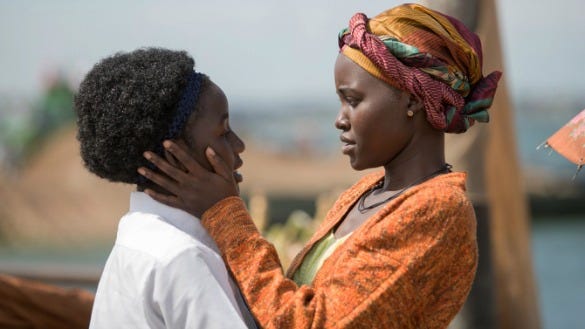Queen of Katwe

I find baseball dreadfully boring, but I’ve admired a lot of baseball movies. Chess is even duller, though I know of at least two very good chess films (“Fresh,” “Searching for Bobby Fischer”). The secret is to focus not on the game but the people playing it. You can transcend a dreary topic with a compelling story and characters.
“Queen of Katwe” largely fails to do this. It’s the true story of Phiona Mutesi, a teen girl from Uganda who dreams of rising out of the slums to become a chess master. Directed by Mira Nair (“Mississippi Masala”) from a screenplay by William Wheeler, based on an article and book by Tim Crothers, it’s actually a pretty typical underdog story along the lines of “The Rookie,” also from Disney, but with an exotic African backdrop.
Phiona is played by newcomer Madina Nalwanga, who brings much enthusiasm but meager ability to the role. It pains me to single out a fledging actor for criticism, but it’s very difficult to sustain a two-hour movie when the main character, who’s in nearly every scene, comes across as the least authentic person in the movie. Nalwanga’s stiff line readings and often inexpressive mien make Phiona hard to relate to.
Veteran actors Lupita Nyong’o and David Oyelowo are much better playing her mother and coach, Nakku and Robert Katende. You can see how much they invest their own hopes and dreams, leavened with past tragedies, into the girl. At times, she is clearly overburdened.
The film also struggles with a poor sense of tempo, often seeming more like disparate scenes strung together haphazardly than a cohesive narrative. In chess terms it's all individual moves with little strategy. At 124 minutes, it’s also at least 20 minutes too long.
(The sound mix and heavy accents of most of the African performers render the dialogue difficult to grasp consistently without straining. I’m reminded of some recent films from the United Kingdom that, despite being in English, could also have been improved with subtitles.)
The story starts in 2007, when Phiona was 11 years old, and takes us up to almost the present. We watch her as a shy girl from Katwe, the lowliest slum of Kampala, peeking into the Pioneers shanty where Katende teaches chess to underprivileged kids.
At first, she’s attracted as much by the offer of free porridge as play. Phiona is so destitute that even the other poor kids single her out for ridicule, complaining of her foul smell. But she endures their insults, washes up and returns.
A born prodigy who can see eight moves ahead, she’s soon defeating all the other children — the boys take it especially badly in a culture ladled with machismo — and even her teacher.
Katende wrangles up a team for a match at a prestigious university, leading to the best sequence in the film as the slum kids experience culture shock in a world of pressed uniforms and green cricket fields. Bewildered by the concept of beds, they curl up together to sleep on the floor. Phiona’s skill and aggressive attacking style soon wipe the smirks off the faces of the rich “city boys.”
Things go on from there. There are predictable disappointments, followed by bucking-up from her mentor. “Do not be quick to tip your king,” Katende coos. A subplot involving Nakku’s factious relationship with her elder daughter, Night (Taryn Kyaze), who dreams of finer things, flits in and out of the spotlight to little effect.
I liked many things about “Queen of Katwe” without embracing the whole experience. In filmmaking, unlike chess, you can’t waste too many pieces without losing the game.



